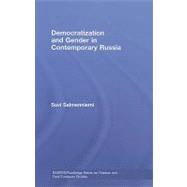
Note: Supplemental materials are not guaranteed with Rental or Used book purchases.
Purchase Benefits
What is included with this book?
| List of illustrations | p. xii |
| Acknowledgments | p. xiii |
| Introduction | p. 1 |
| Theorizing civic activity: civil society | p. 5 |
| Theoretical framework of the study | p. 10 |
| Researching the Russian province: field, data and methodology | p. 19 |
| Outline of the book | p. 29 |
| Patterns of civic activity in Soviet and post-Soviet Russia | p. 31 |
| Citizens' activism in the Soviet Union | p. 31 |
| Basic characteristics of post-Soviet civic activity | p. 33 |
| Civic activity in Tver': structures, practices, actors | p. 35 |
| Conclusion | p. 52 |
| Gender in socio-political activity: power, participation and agency | p. 54 |
| The Soviet gender system and its post-Soviet contestation | p. 55 |
| Interpretative repertoires | p. 57 |
| The character repertoire: gendered qualities and orientations | p. 58 |
| The spatial repertoire: renegotiation of the public-private boundary | p. 64 |
| The socio-structural repertoire and the feminist challenge | p. 70 |
| The inescapable difference | p. 76 |
| Why these repertoires? | p. 79 |
| Gendered practices of participation | p. 82 |
| Conclusion | p. 87 |
| Action and affective ties: identity formation of the Centre for Women's History and Gender Studies | p. 89 |
| Resistance from the margins | p. 90 |
| The CGS: Civic organization and educational unit | p. 95 |
| In search of a new subject: the aims of the CGS | p. 97 |
| Means to an end: activities of the CGS | p. 103 |
| Open and civil society | p. 107 |
| Feminism: a stigmatized and liberating identity | p. 112 |
| Allies and adversaries | p. 116 |
| We as a team and collective: emotional capital and affective ties | p. 120 |
| Negotiating teamwork and hierarchy | p. 123 |
| Conclusion | p. 128 |
| The weakness of collective identity: the Trade Union of Health Care Workers | p. 131 |
| History of the Russian trade union movement | p. 132 |
| Unions and health care in flux | p. 134 |
| Protection and help: the goals of the TUHW | p. 136 |
| Negotiating occupational ethos and collective: morality, dusha and generation | p. 141 |
| Forms of activities: continuities and breaks | p. 146 |
| We as narod: the all-inclusive membership | p. 152 |
| Significant silence: gender | p. 158 |
| Grappling with politics | p. 159 |
| Conclusion | p. 162 |
| Redefining citizenship: views of the authorities | p. 166 |
| Public discourses: civil society, the third sector and social partnership | p. 167 |
| Practices of interaction: from distance to selective partnership | p. 169 |
| Officials and structures | p. 171 |
| Minimal state and extensive third sector | p. 173 |
| Civic organizations as complementing the state | p. 182 |
| Representation and mediation | p. 184 |
| Can organizations make a difference? | p. 187 |
| Conclusion | p. 192 |
| Collaboration and contestation: views of the activists | p. 195 |
| Tactical collaboration and the strategy of involvement | p. 195 |
| Partnership and the redefinition of responsibilities | p. 198 |
| Benevolent indifference and exploitation | p. 201 |
| Collaboration and consensus | p. 204 |
| Contestation and opposition | p. 207 |
| Unraveling and rebuilding co-operation | p. 209 |
| The CGS and the primacy of individual influence | p. 214 |
| The TUHW and institutional influence | p. 217 |
| Conclusion | p. 221 |
| Conclusion | p. 223 |
| Notes | p. 232 |
| Bibliography | p. 246 |
| Index | p. 259 |
| Table of Contents provided by Ingram. All Rights Reserved. |
The New copy of this book will include any supplemental materials advertised. Please check the title of the book to determine if it should include any access cards, study guides, lab manuals, CDs, etc.
The Used, Rental and eBook copies of this book are not guaranteed to include any supplemental materials. Typically, only the book itself is included. This is true even if the title states it includes any access cards, study guides, lab manuals, CDs, etc.